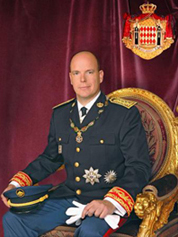Institutions
The Prince:
 The Principality of Monaco's
government is defined by the Constitution of December 17, 1962(amended by Law No. 1.249 of April 2, 2002) as an
hereditary, constitutional monarchy. Monaco is an independent and
sovereign State. The Prince is head of state and represents the
Principality on the world stage. Part of his role is to sign and ratify
treaties. Succession to the throne is in direct and legitimate descent
from the Prince with a priority given to male descendants. In cases where
there is no legitimate descendant, an adopted child can become a pretender
to the throne. The Hereditary Prince has full executive power from the age
of 21, until which date a Regency would be established. In specific areas,
the Prince is assisted in his decisions by consultative bodies : Crown
Council, State Committee.
The Principality of Monaco's
government is defined by the Constitution of December 17, 1962(amended by Law No. 1.249 of April 2, 2002) as an
hereditary, constitutional monarchy. Monaco is an independent and
sovereign State. The Prince is head of state and represents the
Principality on the world stage. Part of his role is to sign and ratify
treaties. Succession to the throne is in direct and legitimate descent
from the Prince with a priority given to male descendants. In cases where
there is no legitimate descendant, an adopted child can become a pretender
to the throne. The Hereditary Prince has full executive power from the age
of 21, until which date a Regency would be established. In specific areas,
the Prince is assisted in his decisions by consultative bodies : Crown
Council, State Committee.
Executive power:
Executive power is shared by a State Minister and 5 Government Councillors, under the High Authority of the Prince. The Government is assisted by consultative bodies : State Committee, Economics Committee.
Legislative power:
Legislative power is shared by the Prince and the National Council. The Prince initiates laws, which are subsequently submitted by the Government to the National Council for a vote of approval. The power of promulgation is the Prince's exclusively.
Judiciary power:
The Prince has judiciary power which he delegates to the Courts and Tribunals. In Monaco, there is no Justice Minister. Judges are independent and the judiciary is self-contained : The Supreme Tribunal deals with constitutional matters, administrative legal procedures and demarcation disputes between authorities.
Other degrees of juridiction are as follows:
Civil Court, Court of Appeal, Revision
Court, Criminal Court.
Some jurisdictions are dedicated to specific
areas such as family, workplace, commercial contracts, ...
Administrative organisation of the Principality:
The communal Council
Consisting of 15 members elected for four-year terms by direct suffrage. Its functions include town planning, district entertainment, preservation of the Monaco's tradition.
The Crown Council
The Crown Council is designated by the Prince and consists of 7 Monegasque members. The President and 3 members are chosen by the Prince alone, while the 3 remaining members are chosen amongst candidates put forward by the National Council. Members meet at least twice a year to discuss important affairs of state. The Crown Council has to be consulted for international treaties, dissolution of the National Council, citizenship applications.
The State Committee
The State Committee is a consultative body with 12 members appointed by the Prince. On the Prince's request, the State Committee comments on government bills and sovereign regulations.
The Economics Committee
The Economics Committee consists of 30 members nominated by the Prince amongst a list of people recommended by the Government, the Employers Federation and the Employees Syndicat. The Economics Committee may advise the Government on specific areas and generally facilitates the relationships between the different parties.
The National Council
The National Council is composed of 18 members elected for 5 years by direct universal suffrage by members of the Monegasque population aged over 21 years. This body votes on bills and budgetary policies. Members meet for general assembly twice a year and may be requested to meet for an extraordinary session by the Prince or by the agreement of more than 2/3 of the Council itself. Sessions are open to the public and a record of the debates is published in the Official Journal of Monaco.



















